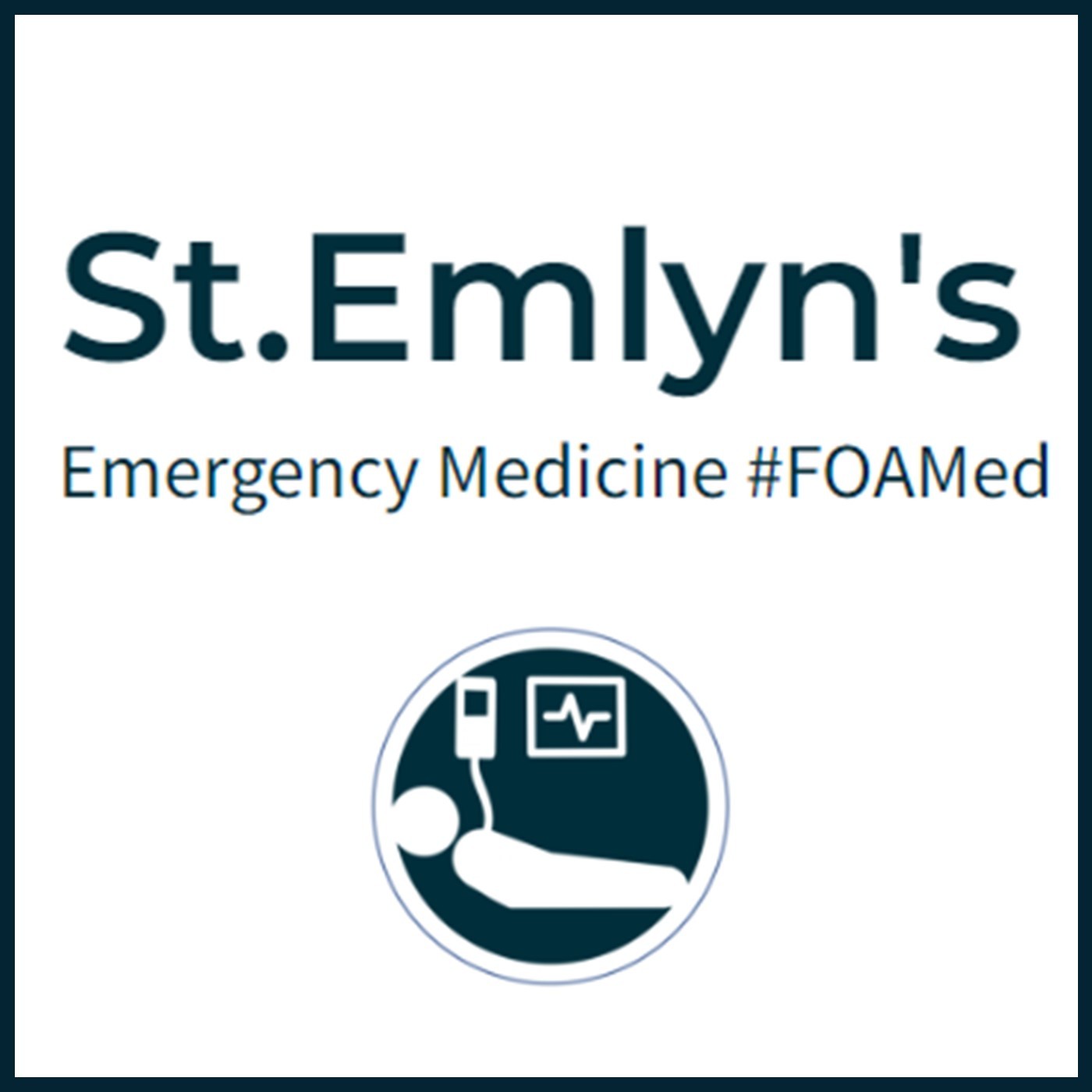
1.3M
Downloads
273
Episodes
A UK based Emergency Medicine podcast for anyone who works in emergency care. The St Emlyn ’s team are all passionate educators and clinicians who strive to bring you the best evidence based education. Our four pillars of learning are evidence-based medicine, clinical excellence, personal development and the philosophical overview of emergency care. We have a strong academic faculty and reputation for high quality education presented through multimedia platforms and articles. St Emlyn’s is a name given to a fictionalised emergency care system. This online clinical space is designed to allow clinical care to be discussed without compromising the safety or confidentiality of patients or clinicians.
Episodes

Wednesday Jan 24, 2018
Wednesday Jan 24, 2018
Understanding Devastating Brain Injury: Key Insights and Guidelines
In a recent episode of the St Emlyn's podcast, Simon Carley hosted experts Dan Harvey and Mark Wilson to discuss the intricacies of managing devastating brain injury (DBI). The conversation covered new guidelines, the challenges in prognostication, ethical considerations, and practical approaches in clinical settings. This blog post provides a comprehensive summary of their insights, focusing on the importance of standardized care, ethical decision-making, and the role of family involvement.
Defining Devastating Brain Injury
Devastating brain injury encompasses severe brain damage that often leads to significant long-term impairment or death. These injuries can result from various causes, including trauma, subarachnoid hemorrhage, hypoxic brain injury, and intracerebral hematomas. The term "devastating" highlights the severity of these injuries, but as discussed, the perception of devastation can vary, complicating management and prognostication.
The Challenge of Prognostication
One of the core issues in managing DBI is the variability in clinical practice across different healthcare settings. This inconsistency can lead to different outcomes depending on where the patient is treated. Dan Harvey emphasized that the new guidelines aim to standardize care, providing a consistent approach regardless of location. The guidelines recommend an observation period of up to 72 hours to gather comprehensive clinical data, crucial for making informed decisions.
Mark Wilson highlighted the difficulty in early prognostication, noting that initial presentations can be misleading. Factors such as intoxication, medication effects, or pre-existing conditions can obscure the true extent of brain injury. The term "perceived devastating brain injury" underscores the subjective nature of these assessments, stressing that what appears catastrophic on imaging may not always align with clinical outcomes.
The Role of Radiology and Clinical Assessment
Radiological findings, while essential, must be interpreted alongside clinical assessments. A severe CT scan may not always correlate with poor clinical outcomes, and vice versa. The discussion stressed the importance of not rushing to judgment based solely on initial imaging or clinical presentation. Recent studies, including those by Hanni Marcus and Mark Wilson, have shown that some patients with poor prognostic indicators can recover better than expected, particularly those with extra-axial hematomas.
Ethical Considerations and Family Involvement
Ethical considerations are paramount in managing DBI. The definition of a "good recovery" can vary widely among patients and families. For example, elderly patients with significant impairments may still value life, even with extensive care needs. The guidelines emphasize the importance of involving families in discussions about prognosis and treatment, ensuring decisions align with the patient's values and preferences.
Understanding the patient's and family's perspectives is crucial in determining the appropriate course of action. This holistic approach ensures that care decisions are not only medically sound but also ethically and personally appropriate. The discussion also highlighted the need for clear communication, helping families navigate complex and emotionally charged situations.
The Importance of Time and Observation
The guidelines advocate for a period of observation to avoid hasty decisions based on incomplete information. This period, typically up to 72 hours, allows for the identification and management of reversible factors, collection of comprehensive medical history, and better communication with the family. The aim is to reduce the risk of prematurely withdrawing life-sustaining treatment.
Practical Decision-Making
Determining the level of care for DBI patients involves deciding whether to transfer them to neurocritical care units or manage them in general ICUs. While specialized care offers advanced interventions like intracranial pressure (ICP) monitoring, evidence does not conclusively show that these measures always improve outcomes. The discussion acknowledged the limitations of resources and the importance of considering logistical factors, such as proximity to the patient's family.
The guidelines encourage clinicians to make informed decisions based on available evidence and specific case circumstances. They stress that not all DBI patients require transfer to specialized centers, especially when prognosis remains uncertain. The focus should be on providing essential life-saving therapies and monitoring the patient's condition.
Transitioning to Palliative Care
When recovery is deemed unlikely, transitioning to palliative care becomes a compassionate and appropriate choice. The guidelines stress the importance of clear communication with the family, ensuring they understand the prognosis and rationale behind limiting or withdrawing aggressive treatment. Palliative care focuses on symptom management, comfort, and supporting the patient and family, addressing not only physical but also emotional and psychological needs.
Organ Donation Considerations
Organ donation is an important consideration for DBI patients when the prognosis is poor. The guidelines recommend discussing this option with the family as part of end-of-life care planning. These discussions should be handled sensitively, providing clear information and respecting the family's wishes. Organ donation can provide hope and purpose in the face of tragedy, potentially saving other lives.
Conclusion and Key Takeaways
The St Emlyn's podcast episode on devastating brain injury provides crucial insights into the complexities of managing this challenging condition. The newly published guidelines offer a structured approach, emphasizing comprehensive assessment, ethical considerations, and family involvement.
Key Takeaways:
-
Standardize Practice: Reduce variability in DBI management by adhering to standardized guidelines, ensuring consistent and high-quality care.
-
Comprehensive Assessment: Utilize both clinical and radiological assessments to inform prognosis. Avoid premature conclusions based on incomplete data.
-
Ethical and Family Considerations: Engage with families to align treatment decisions with the patient's values and wishes. Provide clear, compassionate communication throughout the process.
-
Observation Period: Allow an appropriate observation period to clarify the patient's condition and potential for recovery.
-
Palliative Care: Transition to palliative care when necessary, prioritizing patient comfort and dignity.
-
Organ Donation: Discuss organ donation as part of end-of-life planning, handling these conversations with care and respect.
By following these guidelines, healthcare professionals can navigate the complexities of managing DBI with greater confidence and compassion, ultimately improving patient outcomes and supporting families through challenging times. For more detailed information and resources, visit the St Emlyn's blog and stay updated with the latest in emergency and critical care.

Tuesday Jan 16, 2018
Ep 103 - December 2017 Round Up
Tuesday Jan 16, 2018
Tuesday Jan 16, 2018
Summary: St Emlyn's December Highlights and 2018 Outlook
Introduction
In the latest Sentiment podcast, Simon Carly and Natalie May review the December highlights from St Emlyn's and provide a preview of exciting upcoming events in 2018. The month featured a range of content, including clinical insights, wellbeing initiatives, and journal club discussions, while the upcoming year promises numerous educational opportunities.
December Highlights
1. Insights from the Intensive Care Society Meeting
Dan Horner attended the Intensive Care Society meeting in Liverpool, where Paul Young from New Zealand emphasized the scarcity of high-quality evidence for many intensive care interventions. He urged practitioners to critically evaluate the evidence behind their practices. Another notable topic was contrast-induced nephropathy (CIN), with debates on its clinical significance. This post is essential for those in intensive care, providing a thorough overview of the current challenges and evolving practices in the field.
2. Updated Guidelines for Managing Paracetamol Overdose
A significant update discussed new guidelines for handling accidental therapeutic excess of paracetamol. The new approach moves away from automatic hospitalization, advocating for a more measured response based on clinical assessments and specific blood test results, such as INR and liver function tests. This shift is crucial for emergency medicine practitioners, helping to avoid unnecessary hospital admissions and focus resources on patients who need them most.
3. The ED Wellness Spa Initiative
Laura highlighted the innovative ED Wellness Spa initiative in Manchester, designed to support clinician wellness. The spa provides a dedicated space in the ED for staff to relax and rejuvenate, featuring elements like a gratitude tree and wall, wellness literature, and mindfulness tools. It also includes team-building activities, such as raft building, aimed at fostering a supportive and cohesive team environment. This initiative is a pioneering effort to address healthcare provider burnout, promoting a holistic approach to staff well-being.
4. Pain Management in Minor Trauma
Gareth reviewed a study from the Annals of Emergency Medicine comparing the effectiveness of paracetamol, NSAIDs, and their combination in treating minor musculoskeletal trauma. The study found no significant difference in pain relief among the groups, suggesting paracetamol alone is sufficient. This challenges the routine use of combination therapies and supports a simpler, safer approach to pain management in emergency settings.
5. The Marcy Pan Guidelines on Anorexia Management
Vicki Vella discussed the Marcy Pan guidelines for managing severe anorexia, emphasizing the condition's high mortality rate and the need for careful clinical management. The guidelines include the use of the SUSS (Sit-Up Squat Stand) test to assess physical health and identify critical cases. Vicki also highlighted the issue of diabulimia, where individuals with type 1 diabetes manipulate insulin to lose weight, underscoring the importance of screening for eating disorders in these patients.
Upcoming Events in 2018
1. Teaching Cooperative Course in Cape Town
The year kicks off with the Teaching Cooperative Course in Cape Town from March 20-21. This course aims to transform medical education by moving away from traditional lectures to interactive, hands-on learning experiences. It is an excellent opportunity for educators to refine their teaching methods and engage more effectively with students.
2. BAD-EM Fest and St. Emlyn's Live
Following the Cape Town course, the BAD-EM Fest will be held from March 22-25, offering a unique blend of academic and creative sessions. Later in the year, St. Emlyn's Live will return to Manchester on October 9, providing another chance for professionals to delve into critical topics in emergency medicine.
3. FIX Courses in New York
The FIX (FemInEM Ideas eXchange) conference, set for October 17-18 in New York, focuses on gender equity in emergency medicine. The event features diverse speakers and workshops aimed at promoting inclusivity and equity in the medical profession. It's a must-attend for those committed to fostering a more equitable work environment.
4. RISUS Litology Course in New South Wales
In New South Wales, the RISUS Litology course will offer advanced training in resuscitation. The course, featuring experts like Cliff Reed and Karl Harbig, will focus on high-quality, evidence-based techniques through case-based discussions. This event is ideal for advanced practitioners seeking to deepen their knowledge and skills in resuscitation.
Final Thoughts
The St. Emlyn's team expresses gratitude to its community for their continued engagement and support. While not everyone can attend these conferences, the team remains committed to sharing key learnings through their blog and podcast, ensuring that valuable knowledge is accessible to all. The upcoming year promises further opportunities for learning and professional growth, fostering a global community of compassionate and informed emergency medicine professionals.
As the St. Emlyn's community looks forward to 2018, the team is excited to continue offering high-quality content and engaging with healthcare professionals worldwide. Here's to another year of growth, learning, and sharing in the vibrant field of emergency medicine.
